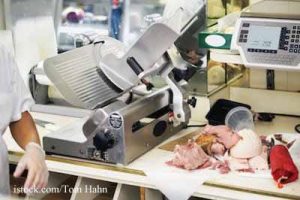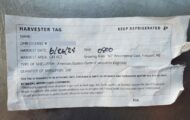The CDC, in its Morbidity and Mortality Weekly Report for the week of April 1, 2016, has published a study on how often retail deli slicers are cleaned. Deli foods are notorious for being contaminated with Listeria monocytogenes bacteria. Listeria infections are the third highest cause of foodborne illness deaths in the country, after Salmonella and Toxoplasma gondii. Deli meats are a major source of listeriosis illnesses. And once Listeria bacteria are present in a facility, it can be very difficult to eradicate.
 Mechanical slicers pose cross-contamination risks in delicatessens. If the machine is used to prepare cheese that is contaminated with pathogens, then that cleaner is used to prepare other foods, they may become contaminated too. Reducing Listeria contamination of these products in delis will likely reduce Listeria illnesses and outbreaks. Good slicer cleaning practices can reduce this risk.
Mechanical slicers pose cross-contamination risks in delicatessens. If the machine is used to prepare cheese that is contaminated with pathogens, then that cleaner is used to prepare other foods, they may become contaminated too. Reducing Listeria contamination of these products in delis will likely reduce Listeria illnesses and outbreaks. Good slicer cleaning practices can reduce this risk.
CDC’s Environmental Health Specialists Network (EHS-Net) studied how often these machines were fully cleaned (disassembled, cleaned, and sanitized) at the FDA Food Code-specified minimum frequency of every four hours. They also looked at staff characteristics related to slicer cleaning frequency. Data collectors assessed about 50 delis in each EHS-Net sit during January through September 2012.
CDC officials interviewed staff members in 298 randomly-selected delis in six EHS-Net sites. Those interviews revealed that about half of the delis fully cleaned their slices less often than the FDA’s specified minimum. Chain-owned delis, delis with more customers and more slicers, managers with food safety training, food safety-knowledgeable workers, written cleaning policies, and food safety-certified managers fully cleaned their slicers more frequently than delis without those attributes.
The FDA Food Code regulates retail food safety. It has science-based guidance intended to improve food safety in retail food service establishments. Not all states and localities have adopted the latest version, issued in 2013, the FDA and CDC strongly encourage its adoption at all levels.
Among 691 managers of eligible delis, 298, or 43%, agreed to be interviewed. In 294 of those establishments, data collectors also interviewed a worker. Most of these delis were chains, and had 1 to 2 slicers.
The analysis of this data indicates that many delis have insufficient slicer-cleaning frequency, which could lead to cross-contamination of deli meats with Listeria monocytogenes bacteria and other pathogens. Both chain and larger establishments’ food safety practices tend to be better than independent and smaller establishments. Chains and larger delis might have more resources, more or better trained staff, or more standardized cleaning procedures.
The data also indicate that training and certification are important in retail food safety. Delis with workers who have more food safety knowledge and experience reported more frequent slicer training. This suggests that workers play an important role in food safety and prevention of foodborne illness outbreaks.
In addition, written slicer-cleaning policies and worker ratings of slicers as being easy to clean were associated with more frequent reported cleaning. And delis with a food safety-certified manager had better reported cleaning frequencies.
The study did reveal that some deli managers might not be aware that cleaning should include disassembly. CDC notes that social desirability bias might have resulted in managers and workers over reporting cleaning frequency. In addition, workers were selected by managers, not at random, so this data might not represent all workers. And the information was collected from English speaking staff members only, so it may not reflect practices in delis with no English speaking staff.




